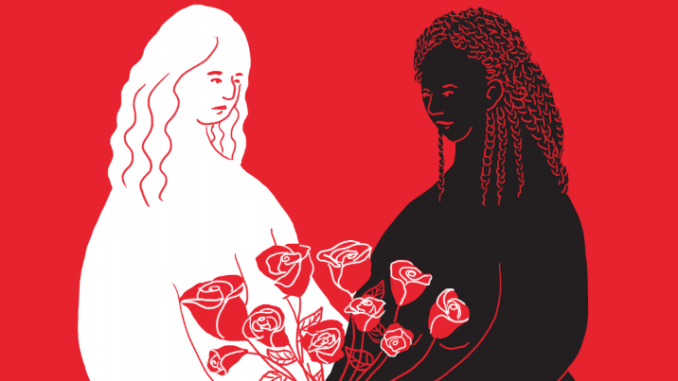
By Jen J, Alice B, Natalie A, Stephanie M, and Alexandra W
Our movement is built on us. To love and protect each other is to love and protect our movement. Our time, our skills build and sustain not only DSA, but a larger movement, a more amorphous hope that a better world is possible and only the working class can win it.
Please take a moment to fill in the Gender Dynamics Survey here.
It is hard to live under capitalism. It is harder to organize under capitalism. It’s hard to pay our rent, our debt. Capitalism gives us health issues and insurance that’s impossible to navigate. We are tired. We are stressed. To build the multi-racial, multi-generational, feminist, non-hetronormative, LGBQTIA+, socialist future that we desire we must understand how capitalism creates barriers to organizing and how to move people past their barriers. We must also understand how the trauma of capitalism teaches us to perpetuate further harm unto others. We are all capable of harming others. As Adrienne Maree Brown says in the essay What is/isn’t Transformative Justice:
“If the only thing I can learn from a situation is that some humans do bad things, it’s a waste of my precious time — I already know that. What I want to know is, what can this teach me/us about how to improve our humanity?”
We wrote this survey largely because our organizing pushed us to question our own attitudes and behavior. Organizing helped us do better. It has transformed us. Good organizing transforms us.
We can’t take it for granted that people already know what solidarity looks like. – Jane McAleve
From the death penalty to cancel culture, transformative justice shows us fear of punitive measures does little to protect survivors or keep harm from happening. Fear of punishment actively keeps us from honestly addressing harm within DSA. Elected leadership is afraid of making the organization look bad. Individual organizers are afraid of having to step back from campaigns that are important to them, they are afraid of being shunned from their communities. This fear is understandable, our society doesn’t teach us healthy accountability practices, but fear does nothing to address transgressions and protect against future harm.
TJ teaches us that no one is born bad. Violence occurs because societal forces of precarity and trauma create and perpetrate violence. Similarly, no one is born with innate racism or sexism. These dynamics are instilled in us by decades of navigating systems that are sexist and racist. Capitalism doesn’t teach us how to stand in solidarity with each other. It doesn’t incentivize us to understand how our various privileges affect how we relate to others. We are not taught to say “I messed up. I’m sorry. Here is how I am going to change.”
Harm isn’t always a crisis. Harm can be big — rape, assault, stalking, and harassment. But it also can be small, everyday interactions that build on each other. It can be men repeatedly speaking over women in meetings or the assumption that a person of color isn’t familiar with socialist theory. It can be who is made to feel welcome, who is prioritized for leadership development, whose ideas are listened to and respected. We are doing the Gender Dynamics Survey to gain a better understanding of the patterns of harm, big and small, within our organization.
Undoing and growing beyond harm is our collective responsibility. It is not about individual bad actors; it’s about how the community responds when transgressions occur. Building community accountability in DSA requires that we understand and unlearn the oppressive dynamics that have shaped — and harmed — our organizing culture. This is not separate or outside of campaign work. How we treat each other and navigate disagreements directly influences our effectiveness as a movement.
Mariame Kaba, a key organizer of transformative justice movement, likes to say that “Hope is a discipline.” Socialists are all optimists — disciplined optimists. We know the world can change because we know that people can change. Change may be difficult, but if we have the courage to face down the bosses in our workplaces, we have the courage to honestly confront the ways in which we contribute to harm in our communities too. This is spadework: hard labor, but necessary if we’re going to start growing in a new direction. We need to dig up the deeply-rooted, harmful patterns of behavior we all participate in so we can plant the seeds of a genuinely liberatory future.
You can take the Gender Dynamics Survey here. The survey will close Sunday, November 4th at midnight. This article was endorsed by the Socialist Feminist Working Group Organizing Committee.
